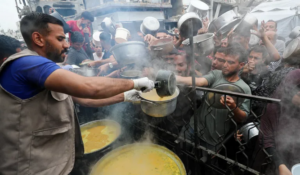World Food Program says it has run out of food stocks in Gaza due to closing of crossings

Palestinians receive food in northern Gaza on 24 April 2025
Nir Hasson and Liza Rozovsky report in Haaretz on 25 April 2025:
The World Food Program says it has depleted all its food stocks for families in Gaza, according to a statement released by the organization on Friday. The WFP said that no supplies, humanitarian or commercial, entered the Gaza Strip for over seven weeks “as all main border crossing points remain closed.”
“For weeks, hot meal kitchens have been the only consistent source of food assistance for people in Gaza,” the organization said in the statement, “Despite reaching just half the population with only 25 percent of daily food needs, they have provided a critical lifeline.”
According to the Hamas-run health ministry in Gaza, 84 people have been killed and 168 have been wounded over the past 24 hours, bringing the death toll to 51,439 since October 7.
The WFP stressed that the seven-week closure of crossings is the longest Gaza has faced since the start of the war. According to the organization’s statement, food prices have jumped by “up to 1,400 percent” since the cease-fire ended, adding that it’s also concerned about the lack of fuel and water for cooking.
The shortages raise “serious nutrition concerns for vulnerable populations, including children under five, pregnant and breastfeeding women, and the elderly,” the WFP said, adding that it also is “forcing people to scavenge for items to burn to cook a meal.”
The organization said the situation in Gaza “has reached a breaking point,” adding that it “urges all parties to prioritize the needs of civilians and allow aid to enter Gaza immediately and uphold their obligations under international humanitarian law.”
The WFP also said it has enough food to feed one million people for up to four months “positioned at aid corridors,” awaiting to enter Gaza when the borders reopen.
Until recently, the WFP operated community kitchens that provided Gazans with about 900,000 hot meals daily. According to humanitarian sources in Gaza, this is the only meal a day for most people, and it does not provide enough calories and essential nutrients. Though it is still possible to find bread and foodstuffs in shops, the prices are very high. Fresh produce like fruits, vegetables, milk, dairy products and meat are nearly impossible to obtain.
Earlier this month, the UN reported that the price of a sack of potato flour has soared by about 450 percent, a single flatbread now costs one shekel, and one egg costs six shekels. It has also been reported that the price of cooking gas has soared by 4,000 percent compared to its price before the war, and the shortage of this fuel is forcing people to burn plastic or wood to cook.
In early March, the World Food Program said that it only had enough food supplies in the Gaza Strip to keep public kitchens and bakeries open for less than two weeks, after Israel had halted the entry of food, fuel, medicine and other supplies.
This article is reproduced in its entirety
